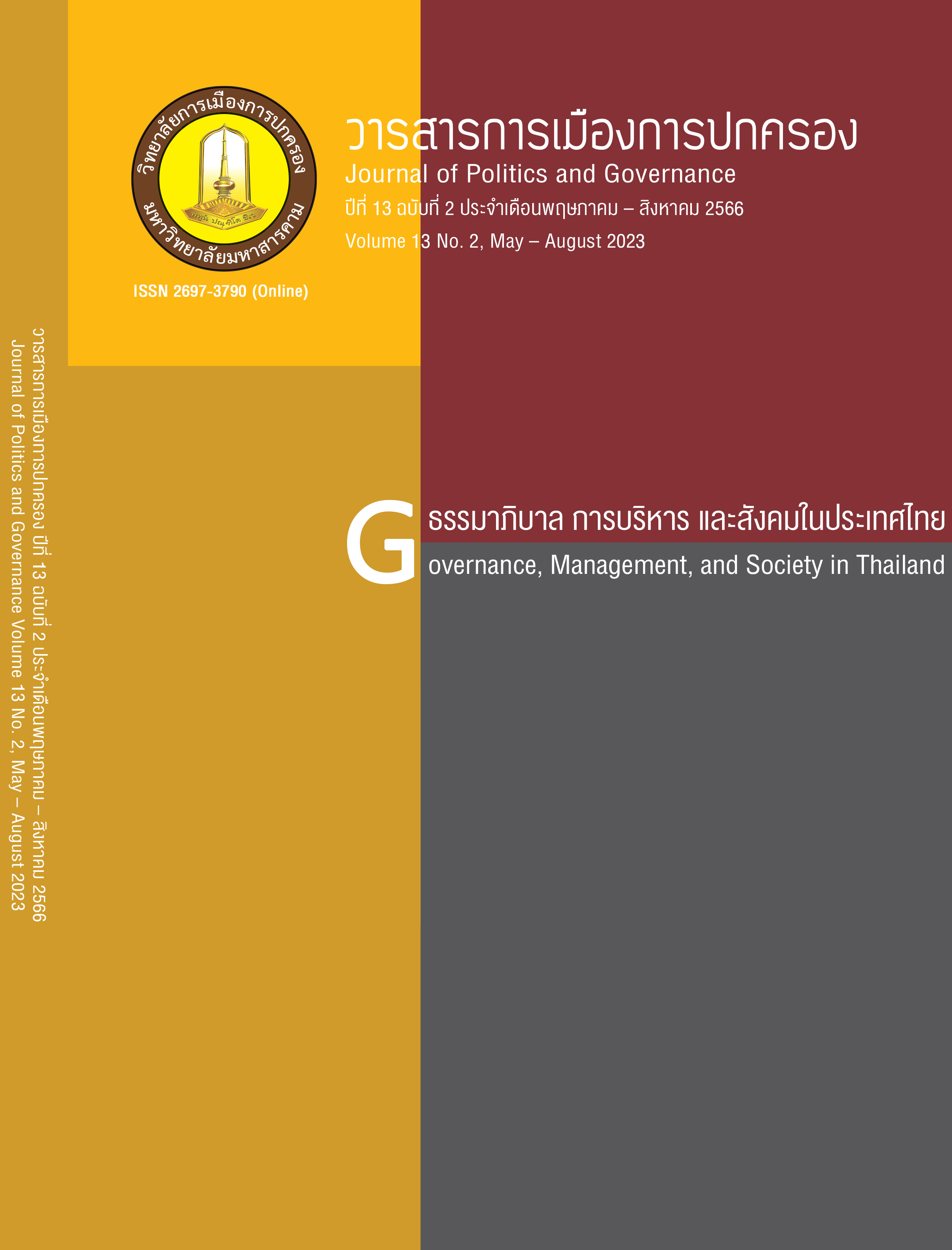Collaborative Governance of Local Governments to promote the quality of life of the Elderly in Samut Prakan Province
Main Article Content
Abstract
This qualitative research aims to 1) analyze the initial conditions and supporting factors of the Collaborative Governance (CG) to promote the quality of life of the elder people in Samut Prakan Province 2) study the characteristics of CG to promote the quality of life of the elder people in Samut Prakan Province and 3) analyze the problems and barriers of CG. The data collection includes documents, in-depth interviews and group discussions. The 15 key informants were conducted for the interview and 8 key informants for focus group discussion. The data were analyzed by the content analysis method. The results revealed that 1) The initial conditions and supporting factors of the CG of Local government to promote the quality of life of the elderly in Samut Prakan Province include 4 aspects: (1) the general context, namely, economic and social conditions, government policies, and laws; (2) the imbalance of resources and power; (3) the motivation to participate of stakeholders such as facilitating factor, expectations and good service of welfare and public service, and the accountability for community management; (4) the factor of leadership, participation both public/private sector, and state mechanisms to promote participation. 2) The characteristics of CG of Local Governments to promote the quality of life of the elderly were the long term and ad-hoc collaborative management among local government agencies, the people's sector, and the private sector. This management was characterized from policy formulation to implementation process as follows; (1) building trust among the stakeholders; (2) building mutual understanding and agreement; (3) working together, and (4) getting results together until its impact on the development of the elderly quality of life. 3) The problems and obstacles to the CG of the Local Governments in Samut Prakan Province were (1) problems in the administration of Local Government agencies with limitations in facilities, personnel, and budget; (2) the inconvenience of traveling for the elderly and the homebound elderly; (3) the problem of the epidemic of Coronavirus-2019 caused the activities of the elderly were temporarily suspended from 2020.
Article Details

This work is licensed under a Creative Commons Attribution-NonCommercial-NoDerivatives 4.0 International License.
References
ชาย โพธิสิตา. (2554). ศาสตร์และศิลป์แห่งการวิจัยเชิงคุณภาพ (พิมพ์ครั้งที่ 4). กรุงเทพฯ: อมรินทร์ปริ้นติ้ง.
ชัยมงคล สุพรมอินทร์. (2562). ความต้องการและการได้รับการตอบสนองความต้องการของผู้สูงอายุจากการจัดบริการสาธารณะของเทศบาลไทย. วารสารสวนสุนันทาวิชาการและการวิจัย, 13(2), 19-29.
คอรี การีจิ, และณัฐฐา วินิจนัยภาค. (2563). การจัดการปกครองแบบร่วมมือกัน (Collaborative Governance) ในโครงการอุตสาหกรกรรมเพื่อการสร้างงานที่ยั่งยืนในพื้นที่ 3 จังหวัดชายแดนภาคใต้. วารสารการเมืองการปกครอง, 10(2), 1-17.
จุฑามาศ ทรัพย์แสนดี. (2563). การพัฒนาคุณภาพชีวิตผู้สูงอายุเพื่อรองรับสังคมผู้สูงอายุขององค์กรปกครองส่วนท้องถิ่นในพื้นที่อำเภอหนองหญ้าปล้อง จังหวัดเพชรบุรี. Lawarath Social E- Journal, 2(1), 65-76.
ฉัตรทิพย์ ชัยฉกรรจ์. (2560). การจัดการปกครองแบบประสานความร่วมมือ (Collaborative Governance): แนวคิด วรรณกรรมคัดสรร และคำสำคัญ. Verdian E-Journal, Silpakorn University ฉบับภาษาไทย สาขามนุษยศาสตร์ สังคมศาสตร์ และศิลปะ, 10(3), 286-298.
ฉัตรทิพย์ ชัยฉกรรจ์. (2561). แนวทางการพัฒนาการประสานความร่วมมือในการจัดสวัสดิการด้านการเงินของจังหวัดน่าน. วารสารสถาบันพระปกเกล้า, 16(2), 81-103.
พลกฤต แสงอาวุธ. (2558). รูปแบบการจัดสวัสดิการสังคมของผู้สูงอายุขององคกรปกครองส่วนท้องถิ่นในจังหวัดสุราษฎร์ธานี. วารสารวิชาการ มหาวิทยาลัยราชภัฏพระนคร, 6(2), 266-282.
ธนาคารแห่งประเทศไทย.(2561).โครงการศึกษาด้านโครงสร้างเศรษฐกิจไทยที่มีนัยต่อการดำเนินนโยบาย. (2565, 30 เมษายน). สืบค้นจาก https://www.bot.or.th/Thai/MonetaryPolicy/EconomicConditions/AAA/AgePeri odCohort.pdf.
พัชราภา ตันตราจิน. (2563). บทความปริทัศน์ การจัดการปกครองแบบร่วมคิดร่วมทำ (Collaborative Governance): ปัจจัยที่มีผลต่อการสร้างและนำไปปฏิบัติ. วารสารเศรษฐศาสตร์การเมืองบูรพา, 8(1), 131-154.
นิภาพรรณ เจนสันติกุล. (2564). การบริหารงานด้านสวัสดิการผู้สูงอายุขององค์กรปกครองส่วนท้องถิ่น: บทสํารวจวรรณกรรม. วารสารสหศาสตร์, 21(2), 254-266.
ณัฐภัทร ถวัลยโพธิ์, และคณะ. (2557). รายงานฉบับสมบูรณ์โครงการ “การศึกษาวิเคราะห์และยกร่างกฎหมายลำดับรองเพื่อรองรับอำนาจหน้าที่ขององค์กรปกครองส่วนท้องถิ่นในการใช้งบประมาณเพื่อจัดสวัสดิการสำหรับผู้สูงอายุ. มูลนิธิสถาบันวิจัยและพัฒนาผู้สูงอายุไทย.
มูลนิธิสถาบันวิจัยและพัฒนาผู้สูงอายุไทย. (2551). รายงานสถานการณ์ผู้สูงอายุไทย พ. ศ. 2550.มูลนิธิสถาบันวิจัยและพัฒนาผู้สูงอายุไทย.
ประเทือง ม่วงอ่อน. (2558). บทปริทัศน์หนังสือ Collaborative public management: new strategies for local governments. by Robert Agra off and Michael McGuire.วารสารบริหารท้องถิ่น, 8(2), 103-107.
ภาคิน เจริญนนทสิทธิ์. (2562). การบริหารนโยบายขององค์กรปกครองส่วนท้องถิ่นเพื่อรองรับสังคมผู้สูงอายุ. (วิทยานิพนธ์ปรัชญาดุษฎีบัณฑิต). สาขาวิชานิติรัฐกิจและการบริหาร คณะนิติศาสตร์ มหาวิทยาลัยศรีปทุม.
วสันต์ เหลืองประภัสร์, และคณะ. (2557). การสังเคราะห์ตัวแบบเชิงทฤษฎีและการบริหารจากผลการดำเนินโครงการวิจัยเพื่อพัฒนากลไกความร่วมมือเพื่อแก้ปัญหาร่วมกันของคนในพื้นที่. สำนักงานกองทุนสนับสนุนการวิจัย.
วสันต์ ศรีสมพงศ์. (2559). การบริหารจัดการแบบร่วมมือในโครงการคลองหมอนนา ตำบลรำแดง อำเภอสิงหนคร จังหวัดสงขลา. (วิทยานิพนธ์หลักสูตรรัฐประศาสนศาสตรมหาบัณฑิต). มหาวิทยาลัยสงขลานครินทร์.
วีรศักดิ์ เครือเทพ, และคณะ. (2558). สรุปผลการวิจัยและข้อเสนอแนะเชิงนโยบาย 15ปี การกระจายอำนาจของไทย. กรุงเทพ: คณะรัฐศาสตร์ จุฬาลงกรณ์มหาวิทยาลัย.
สภาพัฒนาการเศรษฐกิจและสังคมแห่งชาติ. (2562). รายงานการศึกษาผลกระทบจากการเปลี่ยนแปลงโครงสร้างประชากร และข้อเสนอแนะเชิงนโยบายต่อการพัฒนาประเทศ จากผลการคาดประมาณประชากรของประเทศไทย. กรุงเทพฯ: สำนักงานสภาพัฒนา การเศรษฐกิจและสังคมแห่งชาติ.
สุดารัตน์ สุดสมบูรณ์, วิรัตน์ ธรรมาภรณ์, ทวีศักดิ์ พุฒสุขขี, และบุญญพัฒน์ ไชยเมล. (2559). บทบาทขององค์กรปกครองส่วนท้องถิ่นในการดูแลผู้สูงอายุไทย. วารสารเทคโนโลยีภาคใต้, 9(1),121-127.
สำนักงานเลขาธิการสภาการศึกษา. (2562). สภาวะการศึกษาไทย 2561/2562: การปฏิรูปการศึกษาในยุคดิจิทัล. กรุงเทพฯ: สำนักงานเลขาธิการสภาการศึกษา.
เศรษฐวัฒน์ โชควรกุล. (2555). นโยบายการพัฒนาคุณภาพชีวิตผู้สูงอายุขององค์กรปกครองส่วนท้องถิ่นในเขตจังหวัดภาคตะวันออกเฉียงเหนือ. วารสารรัฐศาสตร์และนิติศาสตร์ มหาวิทยาลัยราชภัฏกาฬสินธุ์, 1(1), 146-165.
ศิรินันท์ กิตติสุขสถิต, เฉลิมพล แจ่มจันทร์, กาญจนา ตั้งชลทิพย์, และจรัมพร โห้ลำยอง. (2556). คุณภาพชีวิต การทำงาน และความสุข. นครปฐม: สถาบันวิจัยประชากรและสังคม มหาวิทยาลัยมหิดล.
ศรีเมือง พลังฤทธิ์. (2547).การพัฒนาคุณภาพชีวิตผู้สูงอายุโดยตนเอง ครอบครัว และชุมชน จังหวัดพระนครศรีอยุธยา. (วิทยานิพนธ์หลักสูตรศิลปะศาสตร์ดุษฎีบัณฑิต). สาขาวิชาประชากรศาสตร์. จุฬาลงกรณ์มหาวิทยาลัย.
ศุภสวัสดิ์ ชัชวาลย์. (2555). การเมืองในการกระจายอำนาจ: ศึกษาผ่านบทบาทของนักวิชาการ ข้าราชการ นักการเมืองและประชาชน. กรุงเทพฯ: จุฬาลงกรณ์มหาวิทยาลัย.
อุดม ทุมโฆษิต. (2553). การปกครองท้องถิ่นสมัยใหม่:บทเรียนจากประเทศพัฒนาแล้ว. คณะรัฐประศาสนศาสตร์ สถาบันบัณฑิตพัฒนบริหารศาสตร์. กรุงเทพฯ: แซท โฟร์ พริ้นติ้ง.
Agranoff, R., & McGuire, M. (2003). Collaborative Public Management: New Strategies for Local Governments. Washington, D.C.: Georgetown University Press.
Ansell, C., & Gash, A. (2008). Collaborative Governance in Theory and Practice. Journal of Public Administration Research and Theory, 18(4), 543-571.
Bichler, F. B., & Losch M. (2019). Collaborative Governance in Tourism: Empirical insights into a community-oriented destination. Sustainbility, 11 (23), 1-13.
Everingham, J. A., Warburton, J., Cuthill., M. & Bartlett., H. (2011), Collaborative Governance of Ageing: Challenges for Local Government in Partnering with the Seniors' Sector. Local Government Studies, 38 (2), 1-21.
Emerson, K., & Nabatchi, T. (2015). Collaborative Governance Regimes. Washington, DC:Georgetown University Press.
Emerson, K., Nabatchi, T. & Balogh, S. (2011). An integrative framework for collaborative governance. Journal of Public Administration Research and Theory, 22(1), 1-29.
Hafel, M., Jamil, J., Uamsugi,M., & Anfas. (2021). Collaborative Governance between Stakeholders in Local Resource Management in North Maluku. Journal of Hunan University, 48 (4), 82-87.
Huxham, C., & Vangen, S. (2013). Managing to Collaborate: the Theory and Practice of Collaborative Advantage: Routledge.
Jeon, J. & Kim, H. (2021). Leading Collaborative Governance in the Cultural Sector: The Participatory Cases of Korean Arts Organizations. International Journal of Arts Management, 24 (1), 63-74.
Liu, Zh., Lin, S., Shen, Y., & Lu., T. (2021). Collaborative neighborhood governance and its effectiveness in community mitigation to COVID-19 pandemic: From the perspective of community workers in six Chinese cities. Cities, 116, 103274. https://doi.org/10.1016/j.cities.2021.103274
Lima, V. (2021). Collaborative Governance for Sustainable Development. Leal Filho et al. (eds.), Peace, Justice and Strong Institutions, Encyclopedia of the UN Sustainable Development.
Mandell, M. & Keast, R. (2007). Evaluating network arrangements: Toward revised performance measures. Public Performance & Management Review, 30(4), 574–597.
Nalbandian., John. (2005). Collaborative Public Management: New Strategies for Local Government. The Journal of Politics, 67 (1), 283–284.
Rhodes, R. A. W. (1997). Understanding governance: Policy Networks, Governance, Reflexivity, and Accountability. Open University Press, Buckingham.
Robert. H. W. (2000). Understanding local governance: an international perspective. RAE - Revista de Administração de Empresas, 40(2), 51-63.
Ullah., I. & Kim., D. Y. (2020). A model of Collaborative Governance for community-based trophy-hunting programs in Developing Countries. Perspective in ecology and conservation, 18, 145-160.
WHOQOL Group. (1998). Development of the World Health Organization WHOQOL-BREF Quality of life assessment. Psychological Medicine, (28), 551-558.


